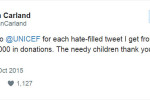For a relatively high-brow TV channel, BBC4 is known for providing top quality programs and dramas. So when the BBC commemorated the 30th anniversary of Islamic Revolution in Iran, I became glued to the channel’s string of intriguing documentaries on all things Iranian, post-1979. There were plenty on Iran-US nuclear politics and the fall of the Shah, all testosterone-fueled stuff. Sticking out from the rest for bearing themes that were uniquely female was the unfortunately-titled Prostitution Behind The Veil (2004). Yes, nothing captures the definitive spirit of being a woman in modern-day Iran better than a program about sex work with groan-inducing references to the veil.
The same documentary aired on Canada’s CBC network, but was dubbed instead of subtitled:
Directed by Nahid Persson, who brought us Four wives – one man (2007), the documentary follows the grim day-to-day lives of two women, Mina and Fariba, in an equally grim corner of the capital city. Making ends meet as sex workers in a country notorious for its curtailment of women’s rights, the two friends juggle their roles as single parents and negotiate their way around the prohibitive laws against prostitution. With their husbands in prison for an assortment of crimes, no relatives willing to help, and a drug habit, the clandestine flesh trade is their last and only resort.
The third character in this bleak tale is their neighbour Habib, a skirt-chasing elderly man. Earlier in the film, he is seen accosting a 17- year old girl and asking for her hand in “sigheh”, a Shi’a-compliant temporary marriage that can last anywhere from 2 hours to 99 years. Astonishingly, she accepts his proposal. The couple approach a local mullah to marry them on the condition that they both agree on a time limit, which to my mind was surreal. Leila, the teenage bride, agrees to six months of “marriage” with Habib and is reminded that despite her husband’s age, he’s a far better catch than any of the younger men around. She gets her own back by disappearing, taking with her the ‘down payment’ paid by Habib on the day they married. Clearly on a rebound and wanting sex without the moral and criminal complications of zina, Habib soon asks Fariba to marry him for a few days. He makes no qualms about his so-called noble intentions to marrying her: he simply sees it as an act of mercy to provide for Fariba and her son. Mercy has never been so cruelly short-term.
The rest of the film sees the their lives slowly spiraling down to new depths – from Habib in full tyrant mode as he takes on his ‘responsibilities’ as Fariba’s future sigheh husband, the discovery that Fariba’s husband sold her battered baby daughter to strangers, to Mina dealing with a violent sigheh marriage. Before Persson flies back to Sweden to finish the film, she leaves knowing that Fariba is off the drugs and is living with a new temporary husband, who’s no different from Habib in more ways than one. Mina on the other hand has handed her baby daughter to her grandmother and left for another town “to find happiness”.
Narrated in Swedish by Persson with English subtitles, the film hears her thoughts as a self-exiled Iranian who fled the country 20 years ago. Unsurprisingly, the narrative text is purposefully dumbed-down for the understanding of viewers who are unfamiliar with standard traditions in Muslim countries with nuggets like “all women have to cover up” and “women do not shake hands with men”.
Persson’s sporadic narration and silent observations has a kind of postmodern approach to documentary film-making that I like, in that her subjects collaborate with her, allowing them to have a equal voice or sometimes a greater one than the film-maker. But her approach sometimes strays into the unsettling realm of voyeurism in my opinion. I felt that one scene showing long close-ups of Mina sleeping on the floor with her baby, whether staged or not, sits on the fine line between invasion of privacy and cinematic realism.
Given Persson’s penchant for filming the darker realities in Iran in her detached, almost-exploitative documentary style, it’s perhaps not surprising that her films have been criticised for eliciting an unbalanced reaction from her target audience who primarily hail from Sweden. For viewers who have not visited or know well enough about the country, it is understandable that Persson’s documentaries can easily stir feelings of outrage and sadness towards an oppressive regime that calls itself moral, but above all, Islamic. Though ultimately, what she wishes for in her films is a positive and constructive reaction to a state of affairs so negatively-viewed in the media. She says in an interview with the Danish Film Institute:
When I was in the revolution along with so many other young people, we wanted to change the world, but now I am at an age where I would be content to change just one thing. But I need to get close to the people in my film. I feel for them. They are not just characters in my film – they are my friends, my sisters.
When I got to know Mina and Fariba, I felt a big responsibility. Mina is the same age as my own daughter. I had maternal feelings for both of them. And once in a while, I felt guilty that I was in the revolution but fled to a safe country, and now I had to say goodbye to them. Everyday I said goodbye to them was terrible. It is my hope that this film will make the world respond to the situation in Iran. Human rights are nonexistent there. People don’t matter in Iran. They have no hope left.
More than half the population are children and young people who have never known what freedom or a normal life is like. My film should not just show how Iran changed after the revolution. The film will be shown in a number of countries and I hope the world will respond, not just watch.



